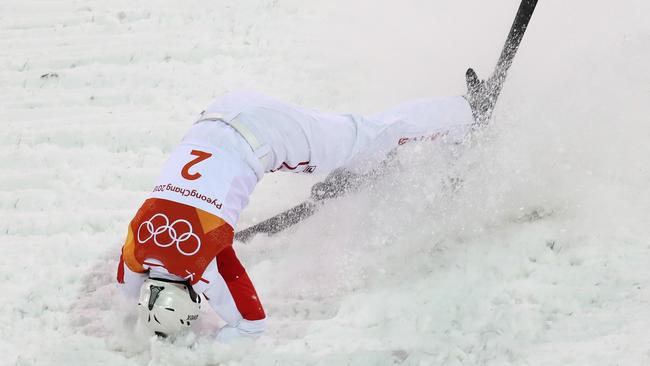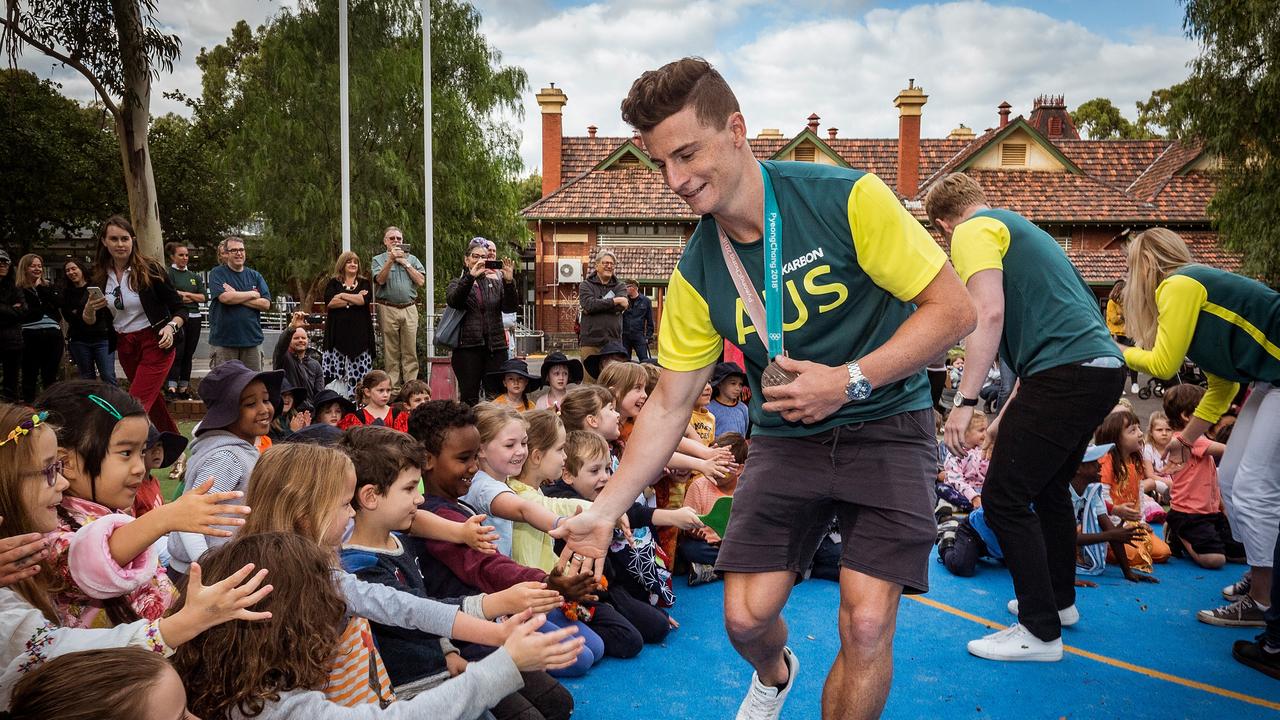Judges backed fallen Chinese skier over beaten Aussie David Morris
Four judges backed China’s Jiu Zongyang ahead of David Morris in the controversial end to the Australia’s Olympic medal hopes.

Four judges in the Olympic aerials competition believed Chinese silver medallist Jiu Zongyang had control on landing in the first round of the Olympic aerial finals — even though video replays showed he was only balanced on one leg before crashing at the bottom of the hill.
That split-second decision in Jiu’s favour by the majority of judges ultimately ended the PyeongChang hopes of Australia’s Sochi silver medallist David Morris after he had a “bobble’’ on landing but remained on his feet, unlike Jiu’s inelegant finish.
It put the 33-year-old in 10th spot, one place outside the top nine who progressed to the penultimate round of the competition.
Morris was sanguine about the scoring of Jiu, even though his coach Jeff Bean had questioned the judges about their shock score.
“I thought I was in,” said Morris immediately after the competition. “I saw him crash and saw the score come up and I was surprised about it. My coach went up to the judges and questioned them on it, and they said they gave him four metres of controlled skiing which is what you need on landing, so he bobbled like me but he stood up and they discounted the last part because it was not part of the jump.’’
While there was sharp dialogue about Morris being robbed of the chance to go further in the competition, it appears only one of the judges — a Russian — agreed with Australian opinion.
Queensland Police tweeted: “If only we had jurisdiction of PyeongChang 2018 aerials because @aerial skier (David Morris) was just robbed’’.
In an analysis of the judging scores The Australian can reveal Morris needed to have been given a more generous landing result by the Chinese judge, and then for Jiu to be penalised by all the judges for his ultimate crash, for the Melburnian to have progressed through to the next round of the finals.
Jiu benefited from having a more difficult jump that was scored more generously for the height he reached and the form he showed in executing the trick.
Judges are given parameters within which they award landing points and the highest and lowest scores are discounted.
Scores between 1.6 and 2.0 are given when there is “no body contact but hand or hands dragging with hard compression, heavy imbalance’’.
Scores between 2.0 and 2.5 are awarded when there is “no touch of hand(s) but some imbalance on landing or ski away; hard compression with no touch’’.
The Chinese judge gave Jiu 2.5 for landing, while the Swiss judge awarded him 2.4, the Canadian and Japanese both gave 2.2 and the Russian deemed it in the lower category with a 2.0.
Both the Chinese and Japanese judges awarded 2.2 for Morris’s landing, with Russia and Switzerland giving him 2.3 and the Canadian a 2.5.
The FIS judging handbook says: “Landing will stopped being judged when the athlete shows control and at least 4 metres after making contact with the snow. If the athlete does not show control within 4 metres of contact with the snow, then landing will be judged until the athlete shows control or reaches finish area.’’
The question is did Jiu show control even though his left leg was all over the place before catching an edge and tumbling over?
The judges’ book states: “The evaluation of a landing starts immediately when the competitor touches the snow and continues until the competitor has exhibited sufficient skiing control.’’
Morris said he knew he was in a tricky position when he was only awarded 111.95 for his jump.
“It was an OK score, 111 is not huge, and I thought it would be borderline (to progress to the next final),” he said. “I had my hopes up, if someone else wants to drag a hand that would be fine ... but no, it didn’t go my way.
“It’s a judged sport, sometimes it sucks, sometimes it’s in our favour, we don’t complain when it’s in our favour and if we really have issue with it we should take up another sport that is timed.’’



